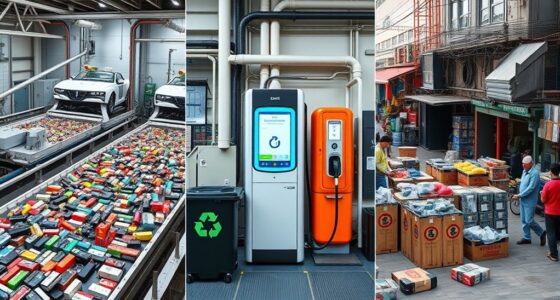Managing the battery lifecycle involves challenges in logistics, safety, and scalability. You need efficient collection systems for diverse battery types, but complex designs make recycling costly and complicated. Safety concerns, like hazards during transport and handling, require strict protocols. Scaling recycling efforts is also tough due to high costs and lack of standardized processes, risking resource depletion and environmental harm. Keep exploring to uncover strategies that can improve these critical aspects and promote sustainable battery use.
Key Takeaways
- Complex logistics hinder efficient collection, transportation, and processing of used batteries across diverse regions.
- Safety risks, including fire and toxic exposure, arise during collection, storage, and recycling of batteries.
- High recycling costs and process complexity limit scalability and widespread adoption of sustainable battery lifecycle management.
- Lack of standardized protocols complicates supply chain coordination and resource recovery efforts.
- Rapid advancements in battery chemistries challenge existing recycling technologies and infrastructure.

Managing battery lifecycle effectively is essential as the demand for energy storage grows, yet it remains fraught with challenges. One of the key hurdles involves establishing efficient battery recycling processes. When batteries reach the end of their usable life, properly recycling them becomes indispensable to recover valuable materials like lithium, cobalt, and nickel. However, the recycling process is complex and often costly, partly because of the variety of battery chemistries and designs. This complexity hampers the development of a streamlined supply chain for recycled materials, which is fundamental for sustainable battery production. If you don’t address these issues, the industry risks depleting natural resource reserves and increasing environmental harm. Strengthening the supply chain for recycled components involves creating standardized collection and processing systems, but these are not yet universally implemented. Without a robust supply chain, recycling efforts can become disorganized, leading to delays and inefficiencies that threaten the overall sustainability of battery lifecycle management. Additionally, advances in battery chemistry research can help improve recycling efficiency and material recovery rates.
Frequently Asked Questions
How Do Recycling Processes Impact Overall Battery Lifecycle Management?
Recycling processes substantially impact your battery lifecycle management by improving recycling efficiency and reducing waste. When you prioritize effective recycling, you recover valuable materials, extend battery lifespan, and lower environmental impact. This streamlines logistics by decreasing raw material demand and enhances safety through proper disposal. Overall, efficient recycling fosters scalability, enabling you to manage larger battery fleets sustainably while minimizing waste and maximizing resource reuse.
What Emerging Materials Could Improve Battery Safety Standards?
Think of a modern Prometheus forging safer batteries; emerging materials like solid electrolytes and fire-resistant compounds could be your answer. These innovations minimize risks of thermal runaway, making batteries safer and more reliable. By adopting solid electrolytes, you reduce flammable liquid components, while fire-resistant materials act as a shield against overheating. Together, they push battery safety standards forward, ensuring your energy storage solutions are both powerful and secure.
How Can Iot Enhance Real-Time Monitoring of Battery Health?
IoT enhances real-time battery health monitoring by using wireless sensors that collect data on temperature, voltage, and current. These sensors transmit information instantly to data analytics platforms, allowing you to detect issues early. This proactive approach helps prevent failures and optimize battery performance. By analyzing trends and anomalies, you can make informed decisions, improve safety, and extend battery lifespan seamlessly.
What Are the Legal Regulations Affecting Battery Disposal Globally?
Think of global regulations as a tightrope you must walk. International treaties and disposal bans shape how you handle battery disposal, requiring you to follow strict rules to prevent environmental harm. Countries impose these laws to control hazardous waste, making sure you responsibly recycle or dispose of batteries. Ignoring these regulations risks hefty fines and environmental damage, so stay informed and compliant to keep your operations safe and sustainable worldwide.
How Do Different Transportation Methods Influence Logistics Costs?
Different transportation methods markedly impact your logistics costs. Air freight offers speed but comes with high transportation costs, while sea freight provides cost-effective solutions for large volumes but takes longer. Road and rail are flexible and can be optimized based on route and volume, helping you reduce transportation costs. By method optimization, you can balance speed and expenses, ensuring efficient delivery while managing overall logistics expenses effectively.
Conclusion
Managing a battery’s lifecycle isn’t without its hurdles, from logistics to safety concerns and scaling issues. You’ll need to stay proactive and adaptable, tackling problems before they grow into bigger headaches. Remember, every challenge is an opportunity in disguise—it’s all about staying ahead of the curve. Keep your eyes open and your plans flexible. With persistence, you’ll turn these obstacles into stepping stones, proving that patience and smart strategies truly pay off in the long run.










